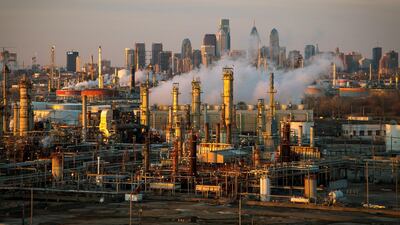The Covid-19 pandemic has set in motion the largest drop in global energy investment in history, with spending expected to plunge in every major sector in 2020 – from fossil fuels to renewables and efficiency.
As a result of plummeting prices and collapsing demand, many energy companies significantly reduced capital expenditure investments in international upstream projects, deferring investments into other areas of the industry.
Eventually these investment cutbacks will trigger a shortage of oil and gas supply. When demand does return to normal after Covid-19, you are not going to be able to produce enough energy for the demand required. The only saviour at that time will be shale oil because you can drill and produce from shale rock within months, instead of the two-to-four-year timeline for conventional oil development projects.
At the moment, there is about 5 million to 7 million barrels per day of available oil capacity that is not being produced. However, there is still about 10mn barrels per day of demand destruction. When economies recover to full strength, Opec will probably fully open the taps, but it will still not be sufficient to meet the demand. The short-term impact will be a spike in oil prices for a while until the oil sector recovers, and supply catches up with demand.
The unparalleled decline in capex in 2020 was staggering in both its scale and swiftness, with serious potential implications for energy security and clean energy transitions.
At the start of 2020, global energy investment was on track for growth of around 2 per cent, which would have been the largest annual rise in spending in six years. But after the Covid-19 crisis brought large swathes of the world economy to a standstill within weeks, it triggered global investment in energy to plummet by $400 billion to $1.5 trillion in 2020, compared with 2019, according to the International Energy Agency.
This is a tough time for the oil and gas industry. Revenues are down significantly for National Oil Companies and International Oil Companies, yet they still need to cover their operating and capital costs. While NOCs, with lower production costs, can still make money at these levels, much of their profit is siphoned away to fund government budgets.
Alternate funds for investment will have to come from curtailing capital costs or borrowing money. The problem is that banks are more reluctant to invest in oil and gas today and are under shareholder pressure to fund cleaner energy projects.
Despite the dramatic consequences Covid-19 is having on the global economy, most analysts predict the energy transition will be accelerated by several years as a result. Trillions of dollars are expected to flow through economic relief packages into the deployment of low- and zero-carbon infrastructure, as well as research and development into technologies that enable it.
In early December, the leaders of the 27 European Union member states reached an agreement on the bloc’s long-term budget and Covid recovery fund – a landmark package worth over €1.8 trillion ($2.19 trillion) to tackle the socio-economic consequences of the pandemic, including a European Green Deal roadmap to a lower carbon economy.
Natural gas has an important role to play in this transition as the world’s fastest growing low-carbon fuel source. It is a critical bridging resource between the era of decoupling economies from coal-fired power generation and the rise of renewables to carry the full load of electrification.
While we have seen a dramatic reduction in the cost of solar and wind power generation, we will still need both conventional energy sources and renewables to meet demand over the coming decades.
Significant technological developments are still required to allow us to wholly depend on renewable resources, as well as many trillions of dollars to transform new technology into an infrastructure that will enable us to produce and use the required energy. Such a transformation will take several decades to complete.
Prior to Covid-19, gas demand growth in 2019 was second only to growth in demand for renewables, pushing the share of gas in the global energy mix to an historic high of 23 per cent. Fuel switching from coal to natural gas was the largest contributor to consumption growth in 2019.
By 2050, gas is forecast to reach 30 per cent of global energy supply, providing a constant and predictable stream of power. Still, for these predictions to materialise, we must ensure that gas remains compatible with the great energy transition by continuously investing in the development of new technologies to decarbonise gas, such as carbon capture and sequestration.
While most NOCs and IOCs have slashed capex this year due to the pandemic, the industry must be swift to recover lost ground in 2021 and make the investments necessary to continuously decarbonise oil and gas production. Otherwise, the transition acceleration triggered in 2020 could move faster in the coming years and deter the much-needed talent and finance required to sustain the industry.
Hatem Al Mosa is the chief executive of Sharjah National Oil Corporation

